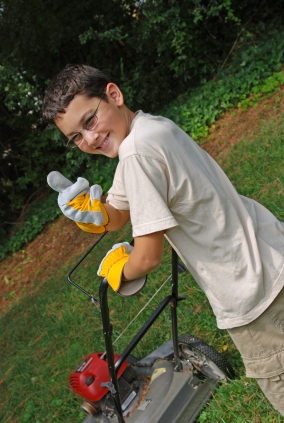 During the Depression my stepfather, Dan, helped his family survive by purchasing fruit and vegetables at the farmers’ market. Then he sold them door to door in the wealthier neighborhoods of his city from his homemade wooden wagon. He was 8 when he launched his career as an entrepreneur.
During the Depression my stepfather, Dan, helped his family survive by purchasing fruit and vegetables at the farmers’ market. Then he sold them door to door in the wealthier neighborhoods of his city from his homemade wooden wagon. He was 8 when he launched his career as an entrepreneur.
When I was a child of similar age, Dan wanted my sister and me to begin learning about money-making ventures. Our first idea was selling vegetable seeds door to door. Dan loaned us the money to buy the seeds and made it clear we would need to repay him before counting our profits. We set out through our neighborhood of townhouses on a warm June morning. After about six neighbors politely replied “no thanks” to our hopeful 7 and 9 year-old faces, the seventh neighbor informed us that kids had come by selling vegetable seeds the week before. That was my first (rather painful) lesson in the value of market research.
When my two older kids reached similar ages, Dan asked if they’d started a business yet. “No,” I responded sheepishly. They’d started soccer, piano, and all the other “classes” that kids these days are kept busy with, but not a business. I stuck this suggestion into my mind’s “yet one more thing to do” file.
The next weekend my sons were washing our cars in the driveway when a neighbor inquired whether they would wash his car next. “Sure!” they excitedly responded. My husband and I helped them decide on a price for the job. After paying them our neighbor asked, “What’s the name of your business going to be?” The boys loved this idea, in addition to the green bills in their hands, and quickly generated the name “Stephen and Daniel’s Neighborhood Services.”
Their business is now in its fourth year. They’ve created billing statements, a logo, and fliers to distribute at neighborhood block parties and the local park.
The main services they offer are:
- Leaf raking and bagging
- Bringing in mail and watering plants when a neighbor is away
- Cat, fish, and chicken care
- Snow shoveling
- Car washing
- Grass mowing
- Lawn and garden watering
- Babysitting (mother’s helper work while a parent is home)
Some of what we’ve learned during this process:
1. Get acquainted with your neighbors. Since we had already grown familiar with folks while out walking or playing at the park, it was much easier for our kids to generate customers. It was also more comfortable for me to have the kids set up a “business relationship” with people I already knew.
2. It was necessary that my husband and I participated in the initial work agreement. We helped the boys think through whether a requested job was appropriate for them. For example, they were asked to mow grass early on and we declined, knowing this would be beyond their abilities. Last summer, however, our 12 year-old began mowing lawns with a push mower.
3. Keep the kids’ prices low and consistent. Children are the ones completing the work and thus the finished product isn’t perfect. Low prices are fair and keep neighbors coming back. Additionally this is a learning experience for our kids as well as a money-maker. Low prices also acknowledge this aspect.
4. Dog walking and care is too much for young kids to handle. (But that’s another post. Just trust me on this one.)
5. It has been gratifying for our sons to have a way to earn money in order to buy the things they want. We require them to save 25% of their earnings in long-term savings, put 10% in a “give” envelope for charity or gifts for others, and they can do what they wish with the rest. This system has also helped our boys with their math skills, by the way. They must figure out all those percentages, and they never want to short-change their “spend” envelope by computing the math incorrectly.
In The First National Bank of Dad, David Owen strongly advises against kids working for money during high school. He thinks that if kids don’t truly need the money, they should be spending free time on extracurricular activities such as writing for the school newspaper or acting in the school play. I agree that those activities are preferable to bussing tables for 20 hours a week.
However, Owen doesn’t address less-invasive work that children might take on, such as Stephen and Daniel’s small business. We give our children a fairly meager allowance which gives them even more incentive to supplement their cash supply through neighborhood work.
Now when my kids want to buy something with their money they are learning the concept of life energy presented in the famous book, Your Money or Your Life. According to authors Dominguez and Robin, we each have a finite amount of life energy, and money is something we choose to trade our life energy for. After a number of steamy lawn mowing sessions, my son Stephen now considers how many sweat hours it would take to pay for the item he’s considering before he buys it. This is a lesson extracurricular activities can’t teach.
This summer another neighbor, Rich, thought Stephen at 13 was old enough to use his electric mower. He inquired whether Stephen would be interested in mowing his front and back yards weekly. Stephen liked the idea and Rich, who’d already raised two sons of his own, asked Stephen to present him with a fair price for this job. Stephen offered a price, then began talking with Rich about the 10K he’d run for the first time this year. Rich happens to be a world-class runner who is always supportive of kids learning his sport.
Toward the end of their running conversation Rich said, “Stephen, I’ve got another proposition for you. You mow my lawn six times and I’ll pay you with a pair of running shoes.” Rich also happens to be sponsored by Saucony. This was exactly the right motivational tool for our 13 year-old boy! Stephen excitedly agreed. At the end of the summer Rich helped Stephen pick out a pair of brand new Sauconys. Stephen chose shiny silver ones adorned with black and red stripes. He (and his parents) couldn’t have been happier with this creative arrangement.
What kind of work did you do as a kid? What lessons did it teach you? Leave a comment below!

 Sweet Spots: Helping Your Kids Find ENOUGH in Their Lives.
Sweet Spots: Helping Your Kids Find ENOUGH in Their Lives.


This is really awesome. If we lived in a more family-friendly neighborhood, I think it’d be great for my kids to do this kind of thing as they got bigger.
I obviously don’t know your neighborhood. But when you said, “if we lived in a more family-friendly neighborhood…” it occurred to me that many of my kids’ most frequent customers are people in our neighborhood who don’t have kids. So, it could be just a matter of getting to know people without kids who live around you… Thanks for the comment!
We live on an a major street and across from a park. So even though there is a park across the street, it’s not the kind of neighborhood where people interact much. And then behind us, there’s a very wealthy neighborhood and those people aren’t much interested in neighbors. I went door to door giving away avocados and only one house opened their door. They took the avocados and closed the door without even introducing themselves or anything. Kinda sucks.
That’s so frustrating. I would have gladly taken your avocados!!
From a friend in Michigan: My daughter’s kids have just started doing jobs in their neighborhood. She ordered online large-print check registers for the kids to use to keep track of how much they take in and how much they spend. Their parents act as their bank.
I love this idea. It takes the teaching about money one step further!
I really enjoy reading it…
Thanks!
love your blog!
Thanks so much!